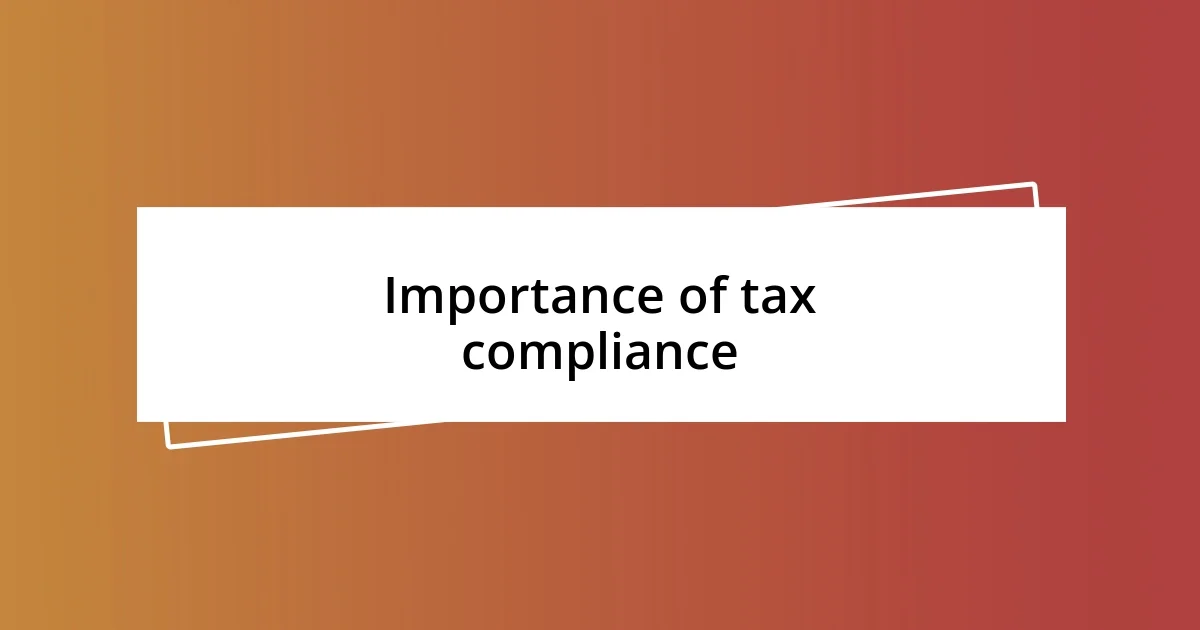Key takeaways:
- Each cryptocurrency transaction can trigger a taxable event, requiring diligent tracking and reporting of gains and losses.
- Tax compliance is crucial to avoid penalties, contribute to public services, and enable better financial planning.
- Utilizing specialized software and consulting with tax professionals can significantly ease the burden of reporting and compliance for cryptocurrency investors.

Understanding cryptocurrency taxation
When I first began investing in cryptocurrency, I was surprised to discover that these digital assets aren’t treated like traditional currency in the eyes of tax authorities. Each transaction can trigger a taxable event, meaning that buying, selling, or simply swapping one cryptocurrency for another might require you to report your gains or losses. I remember feeling overwhelmed by this at first; I had always thought of taxes as a straightforward issue.
Navigating through cryptocurrency taxation can feel like decoding a complex puzzle. I often ask myself, how can something so innovative come with such intricacies? The reality is, just like with stocks, the gain you earn when the value of your cryptocurrency rises might be subject to capital gains tax. I’ve even had moments where I felt a wave of anxiety, thinking about how much I might owe at tax time.
Learning how to track my transactions was essential; I needed a clear record to simplify my tax reporting. I found that using apps designed specifically for cryptocurrency tracking helped streamline the process significantly. Have you explored any tools to manage your cryptocurrency records? In my experience, finding the right method made all the difference in feeling prepared for tax season.

Importance of tax compliance
When it comes to tax compliance, I can’t stress enough how crucial it is for cryptocurrency investors. I’ve seen too many people underestimate the importance of reporting their earnings or losses. Just like any other investment, neglecting to comply with tax regulations can result in significant penalties. I once read about a friend who faced a hefty fine simply because he overlooked a few transactions. It was a tough lesson that taught me to prioritize compliance.
- Tax compliance helps to avoid legal issues and penalties.
- It ensures that you contribute your fair share towards public services.
- Understanding your tax obligations can lead to better financial planning.
- Staying compliant fosters transparency in the evolving crypto market.

Reporting cryptocurrency transactions
Reporting cryptocurrency transactions can be a bit daunting, especially if you’re not accustomed to the intricacies of tax documentation. I remember sitting down with all my transaction records and thinking, “Where do I even start?” Each unique transaction can create a different reporting requirement, which was a real eye-opener for me. It’s essential to maintain a systematic log so that when tax season rolls around, you’re not buried under piles of paperwork.
I quickly found that staying organized made a huge difference. For me, categorizing each transaction—whether it was a purchase, sale, or exchange—helped clarify what I needed to report. I usually recommend using spreadsheets or dedicated software to track these. Have you ever felt lost in documentation? I certainly have, and having detailed records turned that confusion into clarity.
| Transaction Type | Tax Implications |
|---|---|
| Buying Cryptocurrency | No immediate tax; initial cost basis set |
| Selling Cryptocurrency | Potential capital gains tax on profit |
| Exchanging One Crypto for Another | Taxable event if there’s a gain or loss |

Tax implications of trading cryptocurrencies
Trading cryptocurrencies has its own unique tax implications that can be quite surprising. I remember my first experience selling some Bitcoin; I was thrilled by the profits until I realized I needed to account for potential capital gains tax. It made me appreciate how trading isn’t just about making money; it’s also about understanding how those gains fit into my overall tax picture.
Each transaction can stir up a bit of anxiety if you’re unprepared. When I exchanged Ethereum for Litecoin, I was initially excited, but then panic set in—was this going to trigger taxes? It did! This experience reminded me that trading isn’t just a numbers game; it’s vital to consider the tax repercussions of every decision. Have you had similar realizations with your trades?
I can’t emphasize enough how important it is to track your costs effectively. Each time you trade, you’re determining a new cost basis which will eventually affect your tax liabilities. The meticulous tracking felt overwhelming initially, but my reliance on detailed transaction records helped me feel more in control and less anxious come tax season. What’s been your strategy for keeping track? For me, consistency in documentation made all the difference.

Common mistakes in crypto taxation
Many people overlook the importance of accurately calculating gains and losses when it comes to cryptocurrency trades. I distinctly remember sitting with my calculator, trying to make sense of how much my Dogecoin had actually earned me after all those trades. It was easy to miscalculate, especially when factoring in transaction fees. Have you ever found yourself in a similar situation? I realized that missing even a small detail could lead to big tax implications down the line.
Another common mistake is failing to report all crypto transactions, particularly for those using multiple exchanges. Once, I discovered that I had left out a few trades from a smaller platform I had used. The thought of the IRS potentially catching that error was nerve-wracking! It highlighted how crucial it is to maintain comprehensive records across all platforms. In my opinion, keeping a dedicated ledger for every transaction can save a lot of stress later.
A third pitfall is treating cryptocurrencies as regular currency without recognizing their unique tax status. When I first used Bitcoin to buy a couple of art pieces, I thought it was just like any other purchase. However, I quickly learned that spending crypto can also trigger taxable events. Have you ever assumed a transaction wouldn’t have tax implications, only to be surprised later? Understanding the nuances of crypto taxation can be challenging, but it’s crucial for ensuring compliance and avoiding penalties.

Resources for cryptocurrency tax guidance
Finding the right resources for cryptocurrency tax guidance can truly ease the burden during tax season. I remember combing through IRS guidelines, and honestly, it felt like deciphering a foreign language. One resource I found particularly helpful was the IRS website itself, which offers clear and detailed information on the tax treatment of virtual currencies. Have you explored that yet? It can demystify some of the complexities surrounding crypto transactions.
Additionally, tax software designed specifically for cryptocurrency can be a game-changer. I’ve used platforms like CoinTracking and CryptoTrader.Tax, which not only helped me calculate my gains and losses but also simplified the reporting process. The relief I felt when these tools generated tax forms for me was immense! For anyone navigating this landscape, these tech solutions can streamline the experience—what tools have you turned to for guidance?
Finally, seeking advice from more experienced traders or consulting with a tax professional can make a significant difference. I recall speaking with a financial advisor who specialized in crypto; their insights gave me a clearer picture of my tax obligations and even some strategies for minimizing my liabilities. Connecting with knowledgeable people can enhance your understanding of the nuances involved. Have you ever considered reaching out for professional help? It can be a worthwhile investment in peace of mind during tax time.














